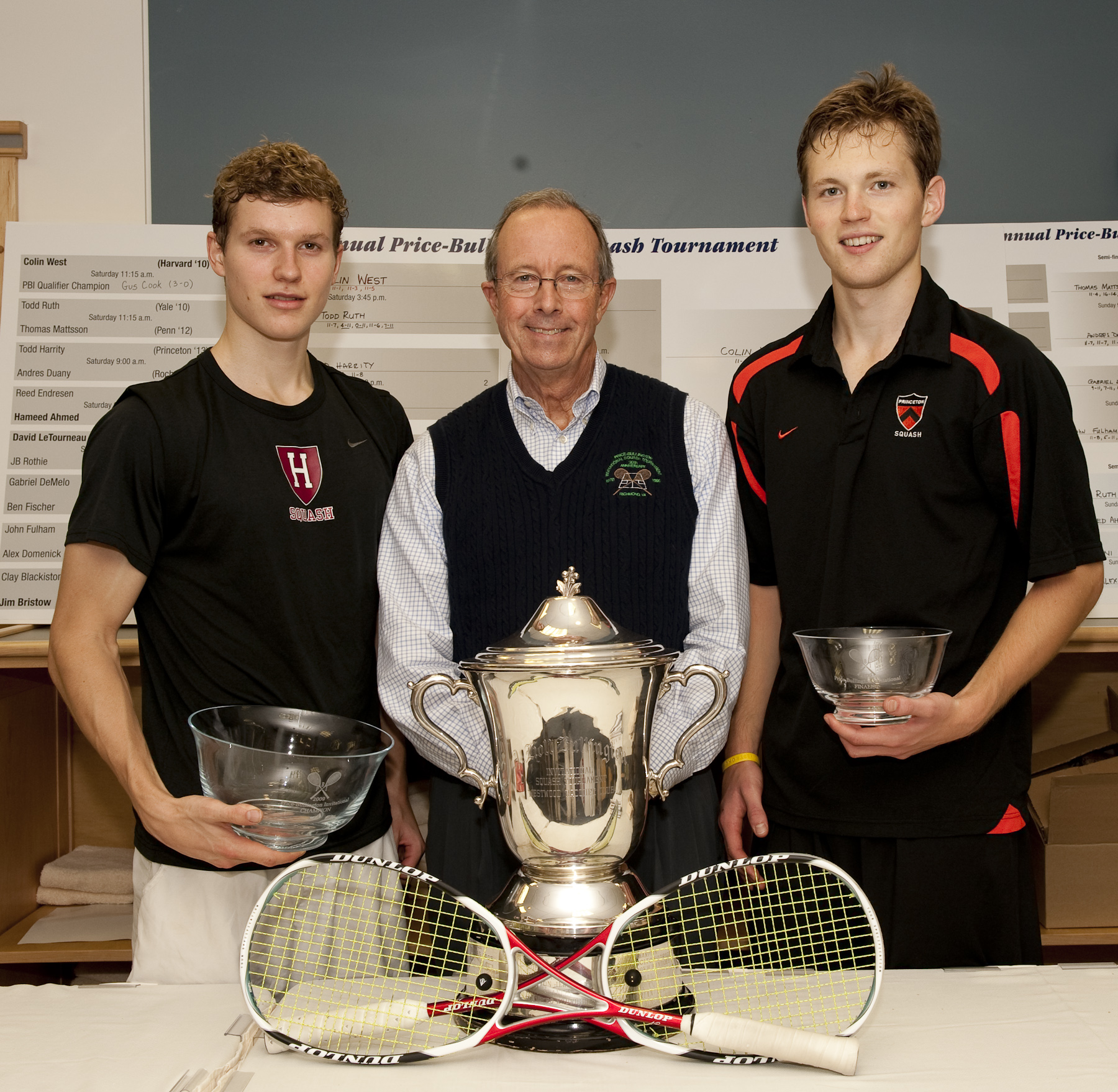
By Ted Price
The 2009 Price-Bullington Invitational was memorable in many ways. First it was the 39th anniversary of this event—the first tournament having been played in 1970. Second, the Tournament was won for the third time in row, by Colin West of Harvard. The last and only other time this happened was when Adrian Ezra, also of Harvard, won the event in 1991, 1992, and 1993. The draw for the tournament was a good one with six All-Americans and the No. 1 player from almost every Ivy League team in attendance. This tournament was historic also for a less than favorable reason: for the first time in many years, Trinity College was not represented.
Leading off the roster of players in order of seeds, in addition to top seed All-American Colin West, were All-Americans Jim Bristow (co-captain of the very strong Rochester team), David Letourneau of Princeton and 2nd Team All-American Hameed Ahmed (co-captain of Rochester). Other colleges were represented by the following: Princeton—Todd Harrity, Clay Blackiston; Harvard—Reed Endresen; Yale—2nd Team All-American John Fulham, Todd Ruth; Rochester—2nd Team All-American Beni Fischer, Andres Duany; Franklin & Marshal—Gabriel de Melo; University of Pennsylvania—Thomas Mattsson; the University of Southern California—JP Rothie and finally England’s Newbury College and The Country Club of Virginia Squash Professional—Gus Cook. Cook had won the P-BI Qualifying Tournament over former UNC tennis great and Westwood Club’s Professional Sean Steinour, to earn the final slot in the main draw.
Before the event, the Tournament Committee, in consultation with the college coaches, decided that with the intensity of the softball game, the old P-BI format of a feed-in consolation through the second round was too hard on the players. In the hardball days the tournament had always featured a feed-in through the quarterfinals which resulted in four players actually playing three full matches on the first day of play. The Committee had become concerned in 2008 when at least one player was injured from the ferocity and length of play that the extra match placed too much stress on player’s bodies early in the season. Thus it was determined that the tournament would be changed to include a first round consolation and a second round consolation which would allow a maximum of two matches to be played in a day.

As expected, the early rounds saw the seeds through with few hiccups, except for Princeton freshman Toddy Harrity upsetting the No. 4 seeded Ahmed in the quarterfinals. Harrity, undefeated in his last two years of junior play and the top-ranked US junior from 2007-2009, put his attrition game to good use in five grueling games, ultimately moving on to the semis 11-7, 9-11, 11-5, 5-11, 12-10.
The semifinal matches lived up to their billing as great squash. At the bottom of the draw, Jim Bristow played Dave Letourneau while at the top, Colin West took on Harrity. In the former match, given the fact that Bristow was the higher seeded player and ranked No. 3 to Letourneau’s No. 5 in the CSA, one could have expected that the Rochester captain would prevail. This was not to be the case as the match was nearly a dead heat with the exception of the first game in which Bristow seemed to be asleep—tinning and whiffing a few balls. The wake up call must have come in the 90 seconds between games as Bristow came back for bear, with reverse corners off deep drives and great retrievals standing him in good stead to win the game 11-9. Letourneau and Bristow traded games in the third and fourth, to set up what turned into a marathon deciding fifth game. With 40, 50 and even a few 60-shot exchanges, Letourneau ultimately capped the match with a magnificent overhead return of service that rolled out of the corner to win 12-10.
At the other end of the draw, the Tiger’s unseeded Harrity prepared to battle the top seeded West. With both players looking to be well-conditioned, Harrity settled in to play his usual game of attrition. West would have none of this and, cutting everything off, quickly captured the first game 11-4.

The second game went largely as did the first with West capturing the “T” and refusing to give it up. The rallies were long and ferocious, so much so that at 3-1, West leading, the Harvard player became physically ill and had to retire from the court for the requisite three minutes. Despite his discomfort, West returned and maintained his lead throughout to go up two games to none.
The third game showed what Harrity was made of, but it cost him dearly. He came on the court with a scowl and determined to not let a single shot get by him. The rallies were very long and the points evenly split, but Harrity won the game on a stroke (11-8), as West left a volley a little wide and Harrity moved in for the kill holding his shot until the last minute.
But the damage to Harrity had been done by expending all of his energy in the third game and West rolled to the finals with an easy fourth game, 11-3.
With both finalists having had only a brief rest after their semis, it was obvious that the advantage of the Letourneau/West match would go to the two-time defending champion West who had a considerably shorter semi than did Letourneau. The advantage became more obvious as play started with West running off seven quick points before Letourneau ever got into the game. Though Letourneau tried to turn up the heat by volleying well and keeping West off the “T,” the outcome of the game—and the match—was never in doubt as West, looking fresher with every shot, forced the Princetonian behind him and nicked and dropped his way to win the match, 11-6, 11-4, 11-2.





